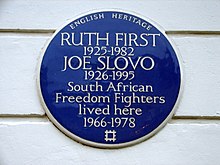Joe Slovo: Difference between revisions
Extended confirmed users 5,097 edits No edit summary |
Rescuing 1 sources and tagging 0 as dead. #IABot (v1.6.1) |
||
| Line 85: | Line 85: | ||
==External links== |
==External links== |
||
*[http://www.anc.org.za/people/slovo.html Joe Slovo] – biographical sketch at the homepage of the ANC |
*[https://web.archive.org/web/20061209052723/http://www.anc.org.za/people/slovo.html Joe Slovo] – biographical sketch at the homepage of the ANC |
||
*[http://www.marxists.org/subject/africa/slovo/1989/socialism-failed.htm "Has Socialism Failed?"] – article by Joe Slovo, first published January 1990 |
*[http://www.marxists.org/subject/africa/slovo/1989/socialism-failed.htm "Has Socialism Failed?"] – article by Joe Slovo, first published January 1990 |
||
*[https://query.nytimes.com/gst/fullpage.html?res=9C0CEEDF1730F934A25753C1A966958260&sec=travel&spon=&pagewanted=all "Old Marxist Returns, With Hope for South Africa"] – article by [[Chris Hedges]], [[The New York Times]] 17 October 1990 |
*[https://query.nytimes.com/gst/fullpage.html?res=9C0CEEDF1730F934A25753C1A966958260&sec=travel&spon=&pagewanted=all "Old Marxist Returns, With Hope for South Africa"] – article by [[Chris Hedges]], [[The New York Times]] 17 October 1990 |
||
Revision as of 15:35, 26 November 2017
Joe Slovo | |
|---|---|
Umkhonto we Sizwe | |
| President | Oliver Tambo |
| Succeeded by | Chris Hani |
| Personal details | |
| Born | 23 May 1926 Obeliai, Lithuania |
| Died | 6 January 1995 (aged 68) |
| Political party | African National Congress South African Communist Party |
| Spouse | Ruth First |
| Part of a series on |
| Apartheid |
|---|
 |
Joe Slovo (born Yossel Mashel Slovo; 23 May 1926 – 6 January 1995) was a South African politician, an opponent of the
A South African citizen of Jewish-Lithuanian family, Slovo was a delegate to the multiracial
Life
Slovo was born in
Slovo joined the
Between 1946 and 1950 he completed a law degree at
Both First and Slovo were listed as communists under the

In 1961, Slovo and Abongz Mbede emerged as two of the leaders of
He returned to South Africa in 1990 to participate in the early "talks about talks" between the government and the ANC. Ailing, he stood down as SACP general secretary in 1991 and was succeeded by Chris Hani who was soon murdered. Slovo was given the titular position of chairperson of the SACP.
Slovo was a leading theoretician in both the SACP and the ANC. In the 1970s he wrote the influential essay No Middle Road which stated that the apartheid government would be unable either to achieve stability or to co-opt significant sections of the small but growing black middle class - in other words the only choice was between the overthrow of apartheid or ever greater repression. At the time the SACP's orthodox pro-Soviet and stage-ist view of change in South Africa was dominant in the ANC-led liberation movement.
Being Jewish and a Communist, Slovo was a demonised figure on the far right of Afrikaner society.[citation needed]
In 1989, he wrote "Has Socialism Failed?" which acknowledged the weaknesses of the socialist movement and the excesses of
It was he who in 1992 proposed the breakthrough in the negotiations to end apartheid in South Africa with the "sunset clause" for a coalition government for the five years following a democratic election, including guarantees and concessions to all sides.
After the elections of 1994 he became Minister for housing in Nelson Mandela's government, until his death in 1995. His funeral was attended by the entire high command of the ANC, and by most of the highest officials in the country, including both Nelson Mandela and Thabo Mbeki.
Acclaim

Civic and similar tributes
Shack settlements built on land occupations in both
Cinema and music
Joe Slovo appears as a character in two films for which Shawn Slovo wrote the screenplay. In the award-winning 1988 movie
References
- ^ Joe Slovo, Anti-Apartheid Stalinist, Dies at 68, NY Times, 1995-01-07.
- ^ "OBITUARY: Joe Slovo". The Independent. 7 January 1995.
- ISBN 978-1-875284-95-5. P. 45.
- ISBN 978-1-84113-049-1. P. 252.
- ^ "Ruth First: Williamson given amnesty". Independent Online (South Africa). 1 June 2000. Retrieved 8 April 2009.
- ^ http://www.justice.gov.za/trc/media/1997/9705/s970512a.htm
- ^ Residences at Rhodes
External links
- Joe Slovo – biographical sketch at the homepage of the ANC
- "Has Socialism Failed?" – article by Joe Slovo, first published January 1990
- "Old Marxist Returns, With Hope for South Africa" – article by Chris Hedges, The New York Times 17 October 1990
- "Joe Slovo: Ode to a mensch" – eulogy by friend Linzi Manicom
